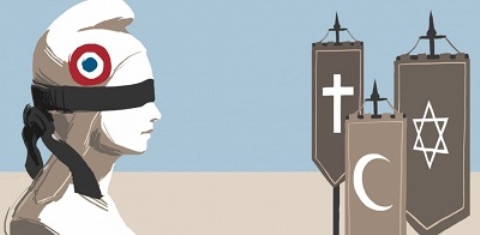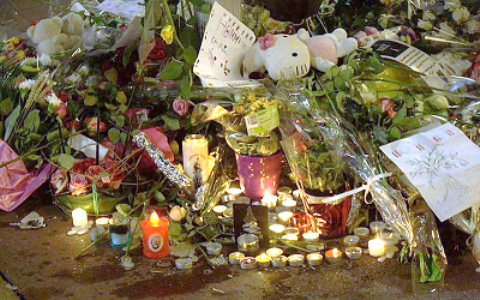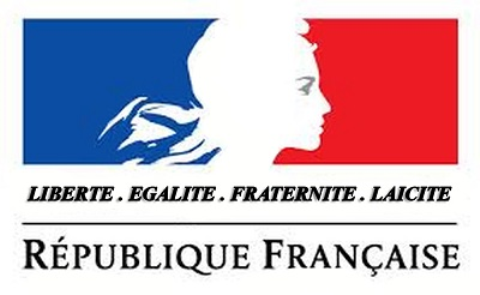ANALYSIS When laïcité destroys egalité and fraternité
by - 14th September 2016

FRANCE and ISIS have a special enmity, and it is compounded by the French form of secularism, known as laïcité.
France’s colonial history and policy of state-reinforced religion blindness adds special intensity to the confrontation.
It is important to understand how particularly powerful the animosity is.
France’s contribution to the coalition attacks on ISIS in Iraq and Syria is second only to that of the United States.
While France had a thousand troops in theatre in March 2016, the UK by comparison had only 275, with Germany at 150, and Belgium at 35.
Meanwhile, close to two thousand fighters of French origin are reported to have joined ISIS forces – more than any other western European country.
Jihadist attacks in France have included the Charlie Hebdo attack in January 2015, the November attack at the Bataclan concert hall later that year, this year’s Bastille Day attack in Nice, and the gruesome killing of Fr Jacques Hamel in Normandy, also in July.
An ISIS video released in mid-August encouraged further Nice-like attacks on France.
Bastille Day
On Bastille Day, 14 July 2016, Mohamed Lahouaiej-Bouhlel ploughed his truck through celebratory crowds on the Boulevard des Anglais in Nice, killing 86 in an attack which ISIS later claimed to have inspired.

Time magazine’s report the next day was headlined ‘Why France Has Become the Number One Target for Terror.’
Just a day earlier, French President Francois Hollande had announced that France’s aircraft carrier Charles de Gaulle would return for a third deployment against ISIS later this year.
Late last year, the carrier group was the first non-US force to head up US Naval Forces Central Command Task Force 50 leading the naval strike forces of Operation Inherent Resolve.
Two Factors
Two unique factors contribute to the intensity of France’s confrontation with ISIS.
The first of these is France’s colonial history in North Africa, and Algeria in particular.
Napoleon’s campaign in Egypt and Syria in 1798-1801 was the start of a French drive to ‘civilize’ the Arab world, and today France still has a paternalistic sense of such ex-French colonies as Morocco, Tunisia and Algeria.
Indeed, French ministers have often declared France to be une puissance musulmane, a Muslim power.
And while the vicious French-Algerian war of a half century ago (1954 to 1962) did not spill over into the neighbouring colonies of Tunisia and Morocco, it did have a marked effect in terms of building Arab Muslim solidarity.
There are now around five million Muslims in France, or 7.5% of its population, and both memories of colonial oppression and the present living situation of so many in the banlieues or suburbs have left many youth feeling further isolated and alienated from French society.
Church and State
One French law in particular tends to reinforce this sense of isolation.

Article 1 of the French Republic states ‘La France est une République indivisible, laïque, démocratique et sociale’.
The official French translation into English reads: ‘France shall be an indivisible, secular, democratic and social Republic. It shall ensure the equality of all citizens before the law, without distinction of origin, race or religion. It shall respect all beliefs.’
The problem, however, is that the English word ‘secular’ suggests a far milder meaning than the French ‘laïque’ suggests.
England’s monarch is the head of the Established Church, and 26 of that Church’s bishops sit in the House of Lords.
The United States Constitution and Bill of Rights features, by contrast, a separation of Church and State, with the First Amendment stating, ‘Congress shall make no law respecting an establishment of religion, or prohibiting the free exercise thereof.’
France’s law goes much further. The principle of laïcité embedded in the 1905 law on the Separation of the Churches and the State outlaws any religious influence on state policies and vice versa.
Laïcité
Andrew Hussey, in his book The French Intifada: The Long War between France and its Arabs, draws out the implications of this law with his definition of laïcité: ‘It is illegal to distinguish individuals on the grounds of their religion.’
Religion, in effect, is strictly confined to private life.
And this taboo, as some call it, is so strict that it has resulted in the banning of such symbolic religious items of clothing as the hijab, turbans, crosses and kippot in public schools, and has ended the broadcasting of Lenten sermons and Orthodox celebration of the Christmas liturgy.
Nor can a French census ask questions about religious affiliation.
For many of France’s Muslims in particular, French insistence that one must be French first and only then Catholic, or Muslim, Jew, atheist or Protestant, has been a further stumbling block.
And nowhere is this issue more acute than in French prisons, hotbeds as elsewhere of extremist and jihadist recruitment, where, according to reports, 70% of the population is Muslim.
How can one tell, though, when it is illegal to ask questions about religious belief or observance?
Problematic
Laïcité, in the form of anti-clericalism, first came to prominence in France at the time of the French Revolution, when both church and aristocracy came under attack.
Indeed, at one point, the Goddess Reason was even enthroned in the cathedral of Notre Dame in Paris, in place of the Virgin Mary.
The idea of France as a non-religious state is now a central pillar of French self-understanding.
But what originated as a protection against the once overwhelming power of the Catholic Church now serves to distance and aggravate France’s growing Muslim population
And as our world, and the Middle East in particular, is stirring with a wide variety of religious fervours, France clings to an ideology which is all too often anti-religious in effect.
It thus gives a special edge both to France’s war on terror, and to ISIS’ focus on France as a target.
Once a solution to a problem, laïcité has now arguably become a serious problem in its own right.
